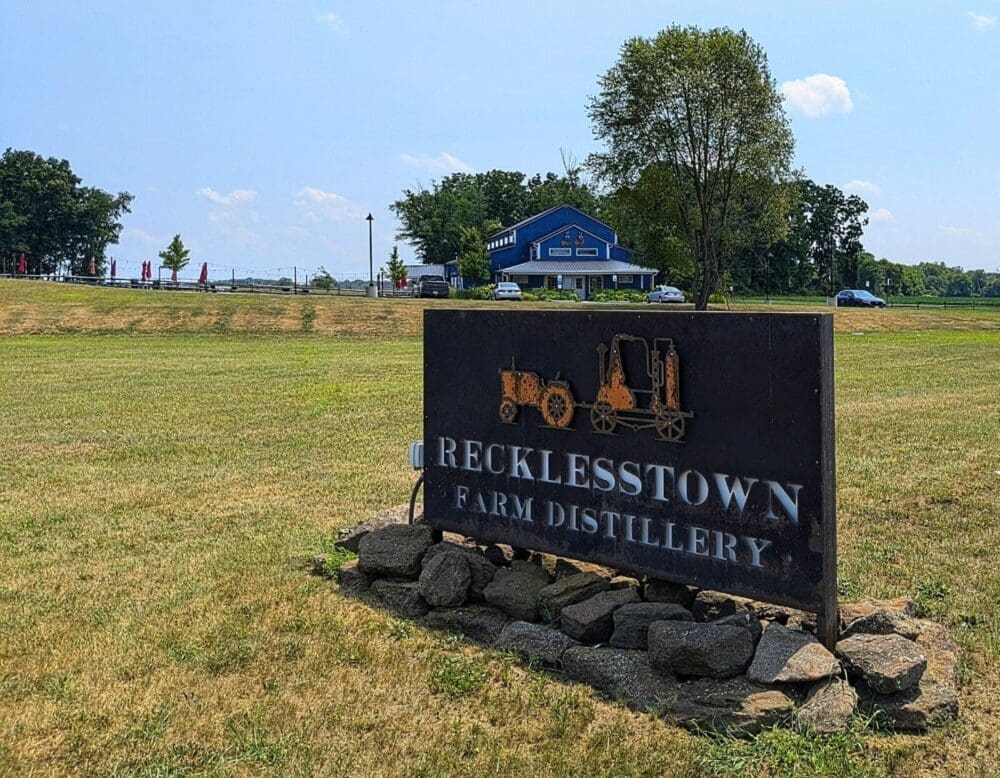On June 5, 1985 Gov. Thomas Kean came to Chesterfield, New Jersey to sign legislation for the Farmland Preservation Purchase Program. In the audience with his parents that day was a young John Probasco. Since he was only in sixth grade, John had no idea how much this new bill would impact his future. His parents enthusiastically signed up to participate. It was not easy being a New Jersey farmer in the 80s.
Generations of Farmers
The Probasco family has been farming for over 300 years. John is the 12th generation to be farming in the U.S. His ancestors came from Holland and were farmers in the area that is now Queens, New York. In 1933, C.B. Probasco, John’s great-grandfather, was the largest potato farmer in New Jersey. Currently the Probasco family is still farming 3,000 plus acres in the state.
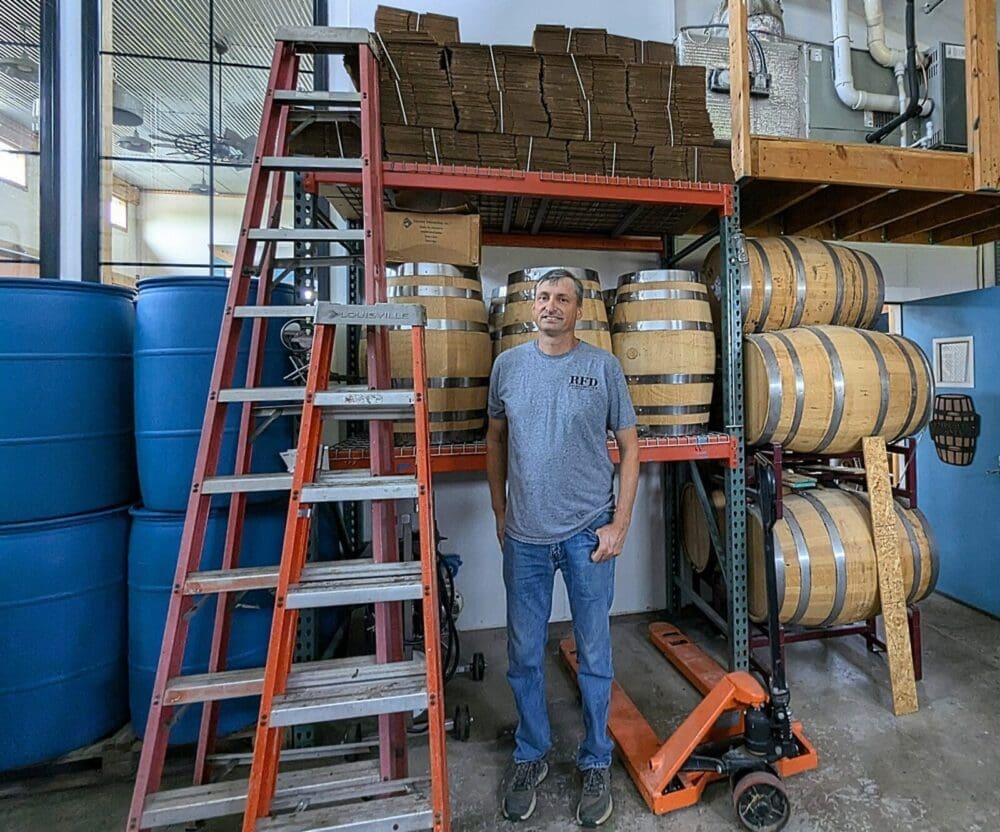
Farm Life
Growing up, John vacillated between becoming a farmer and living another life. He watched his parents as they raised their three kids, ran the farm and survived the tough times for farmers during the 1980s. John recalls going to farm auctions throughout the state with his dad as businesses failed due to unstable commodity pricing, droughts, and the mountain of debt that was drowning farmers. It was around this time the Probasco family transitioned from growing for traditional potato packing and chip potatoes to only potatoes for chip processing. When I asked John who his role models or heroes were, he didn’t hesitate: his parents. They not only kept the farm, they managed to enthusiastically keep everyone happy and healthy. His wife Denise is not only his partner, but his hero as well—for keeping everything together in their busy lives.
Field of Dreams
John attended a liberal arts college in Virginia and studied Business Administration. In 1996, he expanded the farm with his father, returning to his farming roots. Although he attended high school with Denise Nadeau—they didn’t become an item until after college. Denise was teaching High School Biology when she married John Probasco. In 2008, their first daughter Leila was born and five years later, they had Lucas. In 2013, the Probasco’s bought their current farmland along with the corner that is exempted for Preserved Farmland. The intention was to farm potatoes, corn, wheat, soy beans and pumpkins all to be sold in large bulk.
Studying “Still” Life
The corner location was a gem and they knew it. They brainstormed with friends and then the research began. The idea of a craft distillery was new and exciting. The state had just written rules and the concept was in its infancy with only a few already operational in the state. They visited the tasting rooms at Cooper River and Jersey Artisan Distilling. There was no blueprint or how-to-manual on this process. To preserve capital, they did a lot of the work themselves. They spent nights going through architectural magazines looking for design ideas, they read up on laws, they networked. In the end, the Probasco’s borrowed and mortgaged everything; and in 2015, they filed paperwork to open the distillery after their intended partners dropped out.
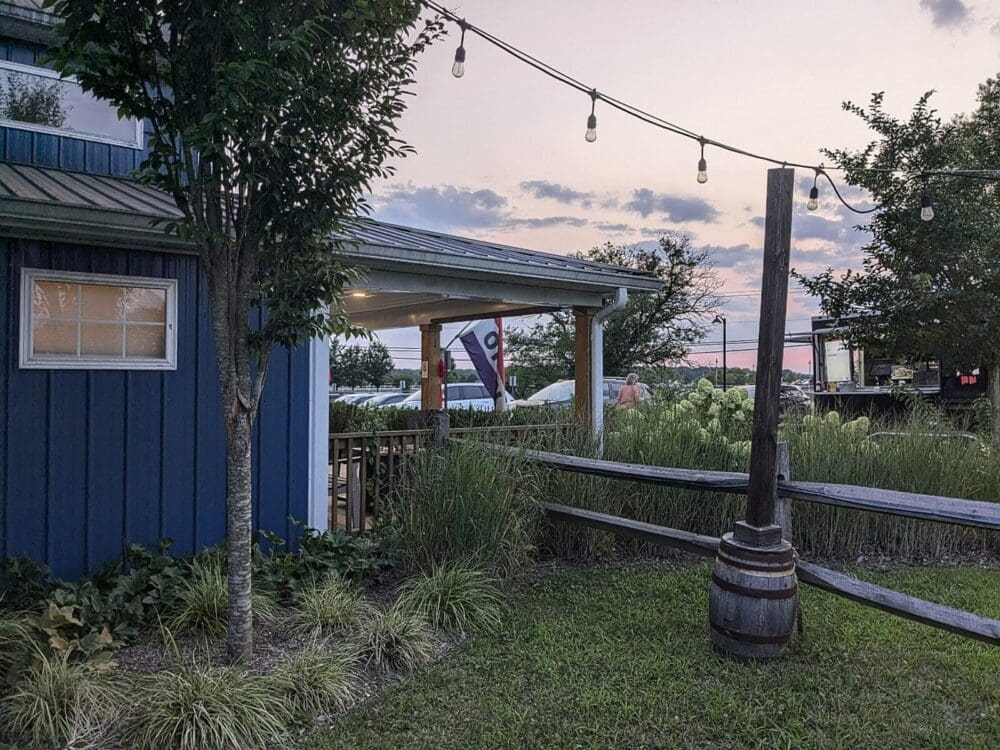
Grand Opening or Closing?
Cooper River Distillery in Camden was one of the first to be granted a craft distilling license in the state. When they closed, Recklesstown Farm was able to hire Ben Donia, their former distiller, in 2018. You can also see one of the old stills from Cooper River on display in the Tasting Room. With Donia on board, the stage was set and all was ready for the grand opening of Recklesstown Farm Distillery.
Recklesstown Farm Distillery opened in July 2019 and nine months later the world closed down to prevent the spread of Covid. What the Probasco family didn’t yet know, was that the shut down was not the end of the business—but an unexpected opportunity! Certain rules were enacted during the shut-down that allowed these types of businesses to sell “to-go” cups and premixed drinks. The Probascos were business people, but they also had a conscience. They couldn’t just sell cups of mixed drinks with cellophane taped over the top to people driving away—that left them rightly uncomfortable. Instead, a whole new sideline of the business was born—bottled cocktails! During the shut-down, the lines were out the door and business prospered. John laughingly explains that if you looked at their initial 5-year business model, the best parts of the distillery didn’t even exist: the bottled cocktails and the thriving outside tasting area.
Homegrown Success
What can you expect to get from the bar? When your business motto is “tilled, milled and distilled on OUR farm”, the expectations are set. The corn they grow is used in the vodkas, gins and whiskeys. The wheat goes into their bourbons. And being Probascos, they better grow the potatoes for the vodka. What they don’t grow on the farm, they source locally—being in South Jersey, local and seasonal fruits are abundant. It’s pretty cool that if you walk to the back of the building, you can see the hopper where John drops the wheat fresh from the field next door. That’s about as farm-to-table as it gets.
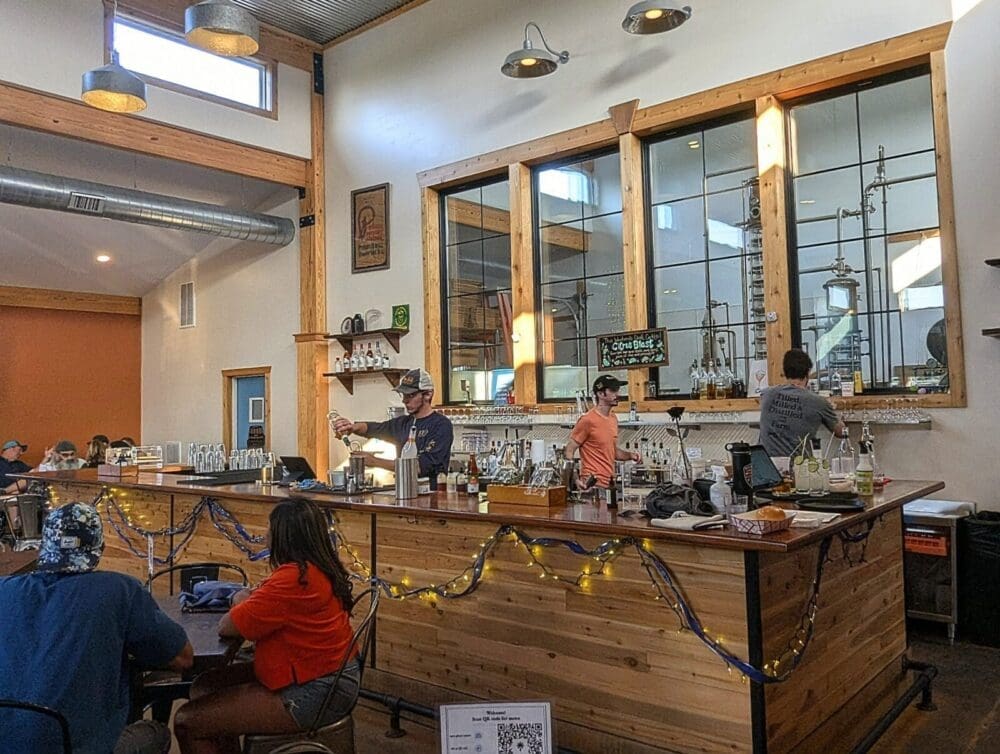
A Nod to History
Every detail about Recklesstown Farm Distillery has been carefully curated. All of the interior design elements were carefully chosen to fit with the industrial farm scene. Even the name of the location is a nod to Chesterfield Township history. In 1712, Joseph Reckless bought a mill in Burlington County. His grandsons Anthony and Robert fought in the Revolutionary War. The town that bore Joseph Reckless’ name had a store, a church, a hotel and Post Office in 1830. However, I guess sending something to a place named “Recklesstown” via post seemed dubious at best, so in 1888 the name was changed and almost forgotten to history.
Rules of Engagement
Recklesstown Farm Distillery has a tasting room in the middle of the field—and it’s absolutely beautiful. They are open Thursday through Sunday. The inside seating can accommodate 88 people and outside there’s plenty of room for 80+. Some of the tables even have heaters. Quick note about the outside area: dogs are not allowed. It’s a limited space and there isn’t room for multiple dogs to be situated comfortably. To make it enjoyable for everyone, decisions had to be made. Also, kids are ONLY ALLOWED on Sundays 12 – 6. No, they aren’t haters – it’s simply because “we make and serve alcohol here!”, and having kids running loose or unsupervised in this environment really isn’t fun for anyone. The vibe at Recklesstown Farm is definitely fun – but it’s responsible too.
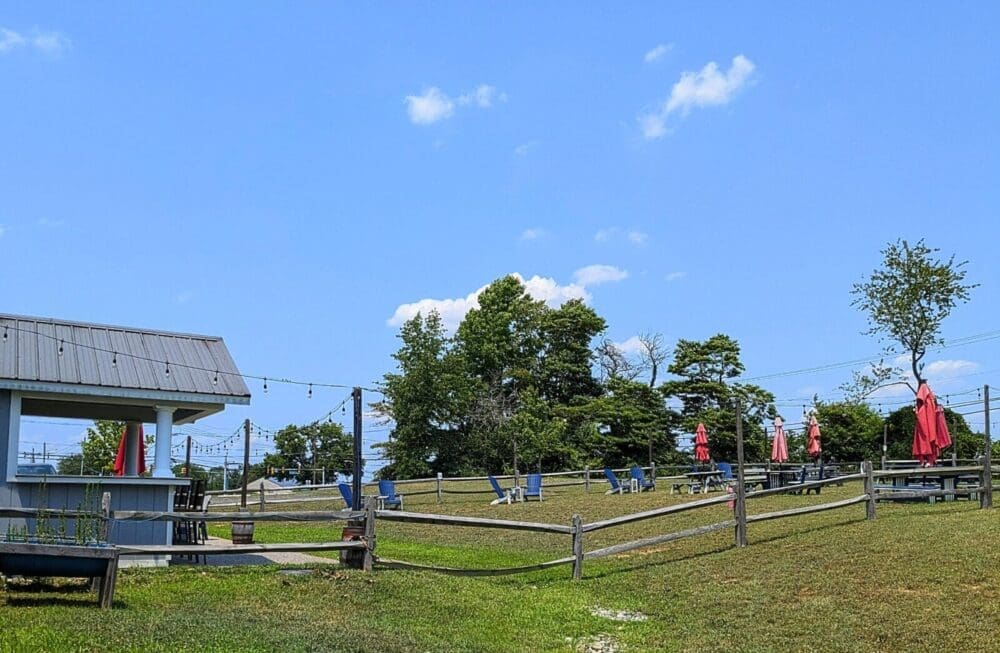
Growing the Business
There’s a staff of 11 -12 people now that includes Clara who is in charge of outreach, special events, ingredients and social media. The day I visited, I got to watch Vicky, the Prep Chef, mashing up tons of blueberries for the upcoming special event. Denise Nadeau has left teaching in order to do all the administrative work for the distillery businesses. John runs the working farm full time. The farm produces upwards of 400,000 lbs. of potatoes each day which they sell to major potato chip producers Herr’s, Utz and Wise.
Crafting a Plan for the Future
Can’t make it to the Tasting Room? Don’t worry! The bottled cocktails they “discovered” during Covid were such a hit, they just expanded the line. You can now sample and purchase these delicious pre-mixed drinks not only at the distillery, but at select Farmers Markets and liquor stores, too. By carefully keeping informed about the newest changes to the Farm Preservation laws, RFD is able to leverage new opportunities in emerging markets. Seasonal farm markets are able to sell their products since Covid. They have also been able to distribute into liquor stores and currently can be found at dozens in NJ. They anticipate rapid growth in both these areas in the future.
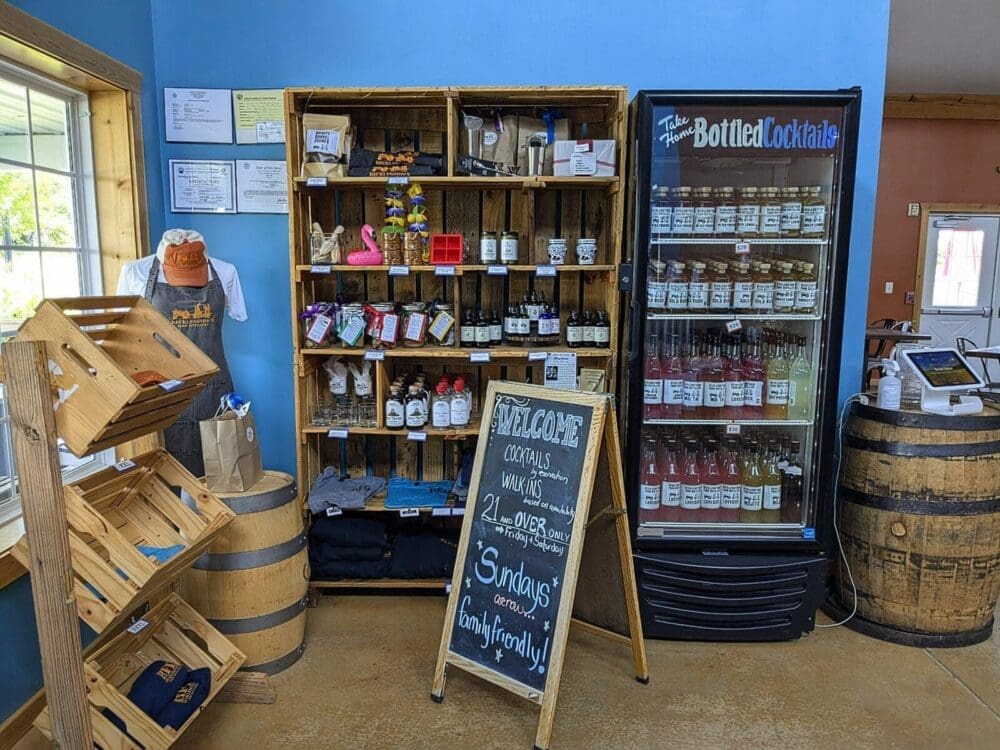
Community Partners
The Probascos are farmers—by birth and by nature. They are big supporters of local businesses and use as many local ingredients as possible. They will acknowledge the local metal working shop, Moschera Metal Shop, for making the road signage and inside signs. They will give a shout-out to the local lavender farm that supplies their lavender for drinks. They believe in “using our product to uplift the local community,” as Clara put it. They are supporters of local farm and agriculture related projects. John has served on the US Potato Promotion Board and was VP of Burlington Co. Board of Agriculture.
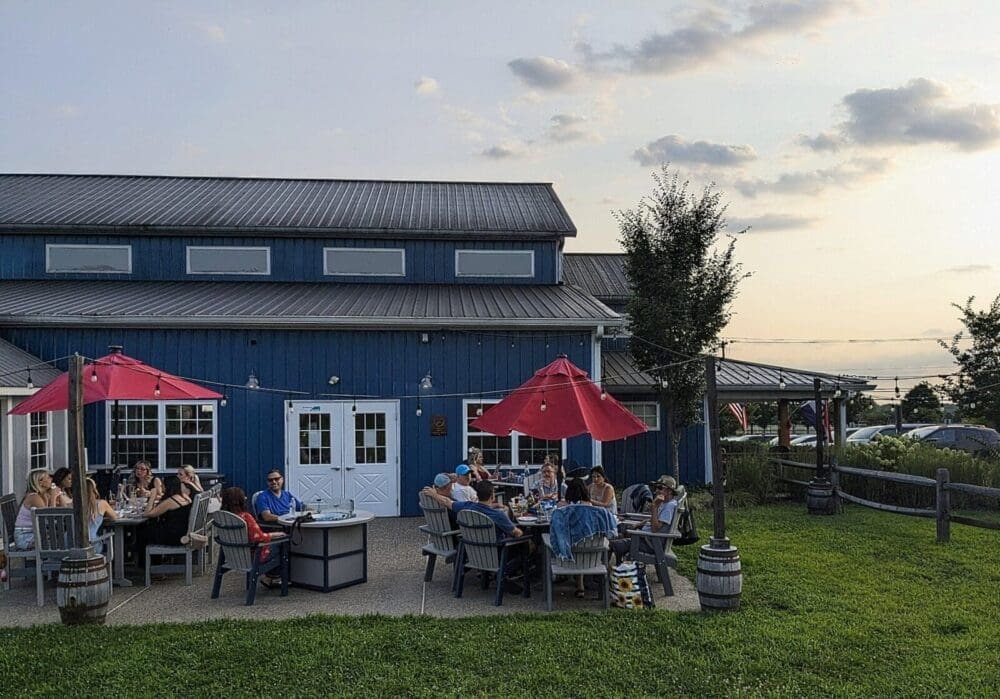
Here’s to the Farmer
John’s mom liked to say, “you can’t take a shovel full of dirt to the grocery store.” I think that really sums the lifestyle up for those of us that don’t get it. The Probasco name is old in NJ, and they “own” a lot of acreage as farmers. But the farming life is a roller coaster and there is no steady paycheck every two weeks auto deposited in your bank account. It’s risky, and it’s volatile—it takes a special kind of person to roll the dice and choose this. Living in Jersey we should never take for granted those brave souls who risk it all to feed us—the family farmers!
I don’t know about you, but I am happy to raise a glass to the folks at RFD who have the courage and fortitude to do this so we all can enjoy the fruits of your labor.
Sue graduated from Rutgers University with a B.A. in English back when you could still get a degree for reading great literature. She spent nearly 40 years working in the Sales & Marketing field with companies ranging from non-profits to small businesses to Fortune 100 Corporations. Most recently retired after nearly 20 years with S & P Global, she is now free to pursue her true passions for hiking, writing and photography. Sue was born and raised in New York State. As a New Jersey transplant, her passion for the special blend of culture and nature that is uniquely Jersey is what Sue loves to share with the world. She has one grown son that she is insanely proud of. Her husband of many decades is an amazing partner both in life and hiking. When not out exploring, Sue is most likely at home reading a novel with her dog.
- Sue Fajgierhttps://thedigestonline.com/author/sfajgier/
- Sue Fajgierhttps://thedigestonline.com/author/sfajgier/
- Sue Fajgierhttps://thedigestonline.com/author/sfajgier/
- Sue Fajgierhttps://thedigestonline.com/author/sfajgier/


